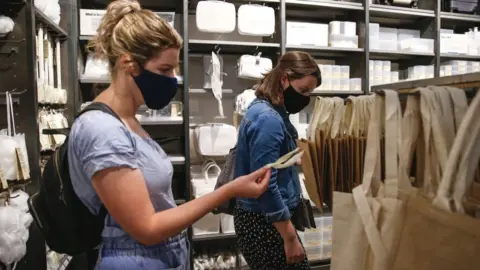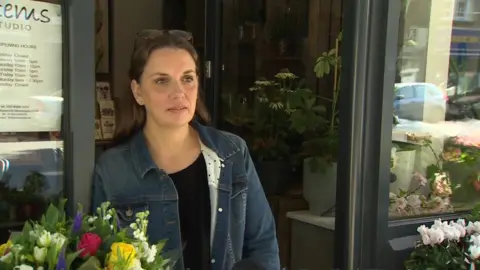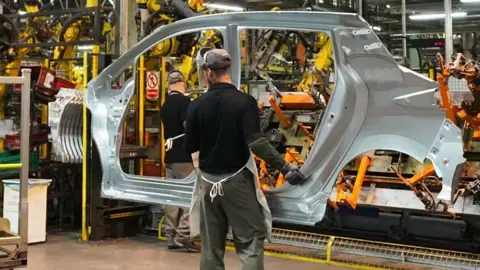Warnings grow about staff forced to self-isolate
 Getty Images
Getty ImagesFears are growing of a "surge" in workers and medical staff having to self-isolate when most Covid rules end in England and Scotland on Monday.
There were new calls for the government to review plans not to ease isolation rules in England before 16 August.
Transport unions warned of "dire consequences" next week as more staff are being "pinged" by the NHS Covid app and told to self-isolate.
Nissan, Rolls-Royce, hospitals and schools have all raised concerns.
However, the prime minister's spokesman said on Friday that the tracing app was "one of the best tools we have" to tackle coronavirus. "We are asking people contacted by the app to continue to isolate," he said.
Despite Monday being called "freedom day" in England and Scotland, critics say that without bringing forward the relaxation of quarantine rules, companies and institutions face a staff crisis as more people have to self-isolate.
Ministers are examining whether to make the NHS app less sensitive, with 530,126 alerts having been sent in England and Wales during the first week of July.
Fully-vaccinated individuals in England will be exempt from having to quarantine over close contact with people suffering Covid-19, but this change will not be introduced until mid-August.
'Absolute chaos'
Rail, Maritime and Transport union general secretary Mick Lynch warned that Monday "will see a surge in workers pinged with a self-isolation instruction next week".
"Even at this late stage, the government, the train operators and the bus companies should issue a clear, legally-backed instruction that levels up the rest of the UK to the safety standards that will remain in force in Wales and Scotland," he added.

Pubs and restaurants also issued warnings over possibly having to close their doors because of the level of pings.
UK Hospitality chief executive Kate Nicholls said the industry was facing "significant staffing challenges", with up to as many as a fifth of staff isolating at any one time.
"Without better intervention, operators will continue to be forced to reduce their operating hours or to close venues completely, missing the opportunity to begin on their road to recovery," she said.
"We urge the government to move quicker on this issue to prevent the summer being cancelled, and vast swathes of the population unnecessarily confined to their homes."
Hugh Osmond, the founder of Punch Taverns, called for those pinged on the NHS app to be allowed to go back to work if they get a PCR test that is negative.
"It is absolute chaos, and clearly the app really isn't fit for purpose because people are getting pinged all over the place, and the vast majority do not ever test positive, let alone be ill," he told BBC Radio 4's Today programme.
Small firms feel particularly vulnerable.
Segolen Goodburn, who runs Stem Florists, in Ealing, west London, told the BBC: "If I get pinged, there is only me - so the shop would have to close. There is no one else to take over. That's the biggest worry."
Rachael Hunt, owner of the Cinnamon Café, also in Ealing, said: "I'm one of the lucky ones, none of my staff have been pinged so far," she says. "But if my staff got pinged, I'd have to shut down."
Andrew Goodacre, chief executive of the British Independent Retailers Association, told the BBC: "In a small shop, if one member of staff tests positive, it's likely that nearly all that team will be deemed to be in close contact, including the owner. Most likely, the shop has to close," he says.
"That's a tragedy when they're just in the process of rebuilding their business," he adds.
 PA Media
PA MediaLord Bilimoria, president of the CBI employers' group which represents 190,000 businesses, said on Thursday that the number of people now required to self-isolate came as a "genuine shock".
"Staff shortages are being felt acutely across all sectors and in all areas of business particularly hospitality and leisure," he said.
Lord Bilimoria believes the NHS Test and Trace system needs an "overhaul" and wants the government to "urgently" bring forward its plans to allow double-jabbed individuals not to self-isolate.
Carmakers Nissan and Rolls-Royce have warned that production could be affected by large numbers of staff being told to isolate, and UK Hospitality, the trade body for bars and restaurants, said it was causing "carnage" among its members.
Hospital staff shortages
England's chief medical officer Chris Whitty has warned that the number of people being treated in hospital with Covid-19 could reach "quite scary" levels within weeks.
The Royal College of Anaesthetists and the Faculty of Intensive Care Medicine issued a joint call on Friday to exempt double-jabbed NHS staff from isolation over close contacts.
"The risk of patients contracting Covid from vaccinated healthcare staff is minimal compared to the damage that patients could suffer by having their treatment delayed," a statement said.
"Without this exemption in place, the NHS will not be able to address the waiting lists. We encourage the government to not wait until August to free vaccinated healthcare workers from the isolation rules - we need this to happen now."
Chris Hopson, the chief executive of NHS Providers, said the hospital trusts the organisation represents are increasingly concerned over dealing with the care backlog "with large numbers of staff unable to work".
"We know that national leaders are working hard to find a solution to this problem. The key is that this solution is delivered as a matter of urgency," he added.
Health bosses in Sunderland have asked staff to consider postponing holidays to help the trust as it comes under "extreme pressure" because of a surge in coronavirus cases.
The Downing Street spokesman said that, as Covid cases go up, it was expected the number of people asked to isolate would increase.
He would not be drawn on possible exemptions for specific industries, saying the government wouldn't comment on "hypotheticals" - while adding all things are kept "under review."
Downing Street also downplayed the possibility of being "pinged" through a wall shared with a neighbour, following widespread reports on Friday. The spokesman said it was "highly unlikely" because the app uses low-energy Bluetooth.
The government is therefore "confident" that this is not contributing to a "large number of individuals being asked to self-isolate", he said.
